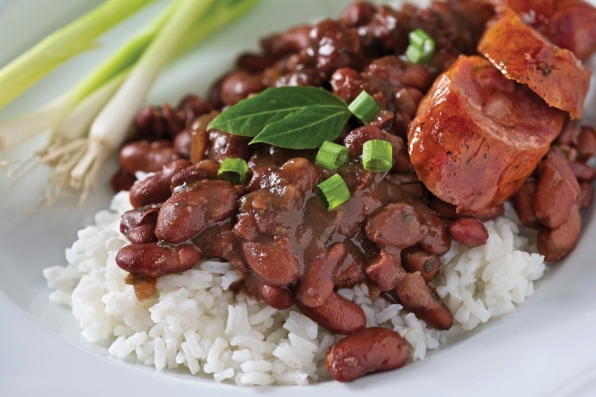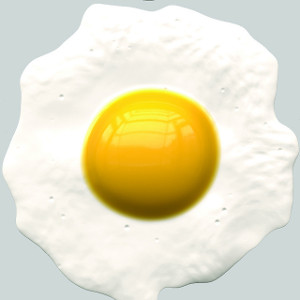A UK doctor says folks there who have adopted a Veggie Diet are suffering serious deficits of an essential nutrient found primarily in Red Meat and Dairy products. And those who are responsible for making official daily dietary food intake recommendations seem oblivious to the omission…
 Traditional Red Beans and Rice: Without the Sausage, it’s long been considered a
Traditional Red Beans and Rice: Without the Sausage, it’s long been considered a
staple Vegetarian dish, championed for providing a complete dietary
protein. But how does it measure up for choline?
Regular readers of the Fab Food Blog will be well aware of the looming food supply crisis and the warnings from those who predict future developments that we’ll all have to get used to Veggie-Protein-based diets by as early as 2030, when traditional Animal Protein sources will start to become unsustainable.
But Dr. Emma Derbyshire warns that current Vegetarian and Vegan diets may be perilously short of an element essential to brain health; choline.
What is choline?
Choline is an essential dietary nutrient that is produced in small amounts by the liver, but the amount produced is not enough to meet the requirements of the human body. The stuff is critical to brain health, particularly during fetal development. It also influences liver function, with shortfalls linked to irregularities in blood fat metabolism as well as excess free radical cellular damage, Derbyshire explains.
The primary sources of dietary choline are Beef, Eggs, Dairy products, Fish, and Chicken, with much lower levels found in Nuts, Beans, and Cruciferous Vegetables, such as Broccoli.
What’s the problem?
In 1998, recognising the importance of choline, the US Institute of Medicine recommended minimum daily intakes. These range from 425 mg/day for women to 550 mg/day for men, and 450 mg/day and 550 mg/day for pregnant and breastfeeding women, respectively. European officials have since published similar recommendations. But Derbyshire says recent surveys show that choline intake is not meeting the recommendations in most jurisdictions.
Derbyshire says she’s not sure why choline has been given a higher profile in most mainstream diet and nutrition statements, but she is certain that, “[m]ore needs to be done to educate healthcare professionals and consumers about the importance of a choline-rich diet, and how to achieve this.”
The takeaway
“If choline is not obtained in the levels needed from dietary sources per se, then supplementation strategies will be required, especially in relation to key stages of the life cycle, such as pregnancy, when choline intakes are critical to infant development,” Derbyshire concludes. And choline becomes more important for us all as the future becomes ‘now’, and choline-poor Veggie Protein sources become mainstream.
My take
This issue is representative of what I suspect will be man more that emerge as consumption of Animal-source proteins drops off and that of Veggie-source replacements continues to rise. Let’s hope researchers like Dr. Derbyshire continue to recognise the trouble spots and encourage officials and ‘authorities’ to act appropriately before the ‘issues’ become emergecies.
~ Maggie J.

